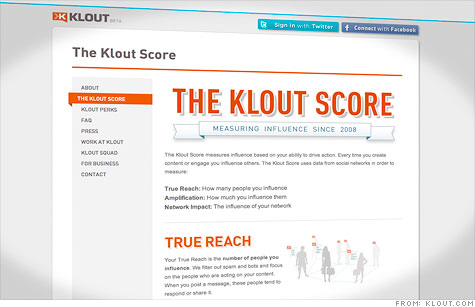Search News

John Scalzi is the author of Old Man's War and other science fiction novels. He runs a blog, Whatever, where this commentary originally appeared.
I got a Klout account a few months ago when it did that promotion of allowing its members to get an early view of the U.S. version of Spotify, and that was reason enough to give it a spin. Well, I still have my Spotify account, but this morning I deleted my Klout account.
Part of that was due to the various kvetches I've seen regarding Klout's rather lackadaisical approach to privacy, noted by everyone from Charlie Stross to The New York Times -- but really, at the end of the day (or the beginning of it, as I deleted the account this morning), I left Klout because I suspect the service is in fact a little bit socially evil.
Klout, for those of you unaware of its existence, purports to provide some general ranking of one's influence on the Internet, across the various social media. The service apparently sucks in data from all the other social media services you belong to which it tracks, throws that into an algorithmic pot, and renders it down to number between one and one hundred. Then you can look at your Klout score relative to other people's scores and see where you fit in the grand scheme of influence, at least according to Klout.
Wherein lies a problem: Who made Klout the arbiter of online influence, aside from Klout itself? I could rank your influence online. If you like: I'll add your number of Twitter followers to your number of Facebook friends, subtract the number of MySpace friends, laugh and point if you're still on Friendster, take the square root, round up to the nearest integer and add six. That's your Scalzi Number (mine is 172). You're welcome.
Is this number any less indicative of your actual online popularity than Klout's scores? As far as you know, no.
I'm sure Klout has what it considers an excellent rationale for whatever stew of algorithms it uses to assign you a number, but neither you nor I know what it is, or (more importantly) why it's valid as an accurate determiner of your online influence and popularity. As far as any of us know, one's Klout score is determined by college interns, each feverishly rolling a pair of ten-sided dice, and then that number is allowed to oscillate within a random but bounded range every day to give the appearance that something's going on.
However, even if we did know the process Klout uses to determine one's influence, there comes the question of what purpose it serves. It serves Klout's purposes, it seems, in that they have a nice little business quantifying its members' desirability to companies who offer stuff to the members with the implicit agreement that they then talk about it on their social media sites. Good for Klout, and -- in the interest of accuracy -- I did get early access to Spotify out of them, and did write about it, so there you are.
But what purpose does it serve for Klout's members? Aside from the occasional quid pro quo freebie, it seems that what Klout exists to do is create status anxiety -- to saddle you with a popularity ranking, and then make you feel insecure about it and whether you'll lose that ranking unless you engage in certain activities that aren't necessarily in your interest, but are in Klout's.
In other words Klout exists to turn the entire Internet into a high school cafeteria, in which everyone is defined by the table at which they sit. And there you are, standing in the middle of the room with your lunch tray, looking for a seat, hoping to ingratiate yourself with the cool kids, trying desperately not to get funneled to the table in the corner where the kids with scoliosis braces and D&D manuals sit.
This is sad, and possibly evil. It's especially sad and possibly evil because as far as I can see, Klout's business model is to some greater or lesser extent predicated on exploiting that status anxiety.
I clicked over to Klout's "perks" section not long ago -- "perks" being the freebie things the service wants you to market for them -- and rather than being presented with a selection of perks available to me, I was presented a list of perks I wasn't qualified for, because apparently I wasn't smart and pretty and popular enough for them, although Klout seemed to suggest that maybe if I did my hair a little differently, or wore some nicer shoes (or dragged more people into their service, making myself more influential in the process) maybe one day I could get the cool perks.
At which point I decided that Klout was actually being run by dicks, and getting let into Spotify a week early -- or whatever -- wasn't worth being seen with dicks, or supporting that particular business model.
So now I'm out. It was interesting for a while, but ultimately I don't care how influential Klout thinks I am, and I get enough perks in life without Klout's queen bee corporate marketing style. And even if I didn't, I'm more comfortable with who I am and my place in the world (online or otherwise) than Klout needs me to be in order for me to be a useful member for it.
All of which is to say: Bye, Klout. It's not you, it's me. Well, actually, it is you. I pretty sure I'm too good for you. But, hey: Thanks for the Spotify. ![]()